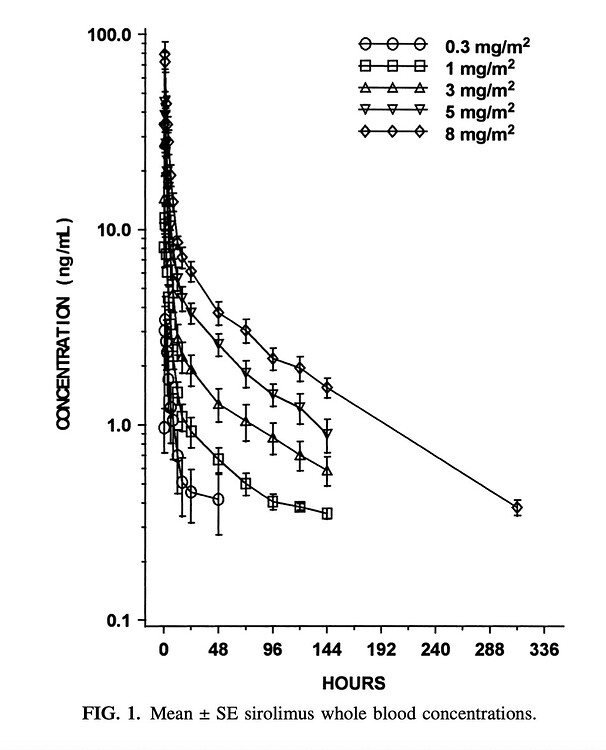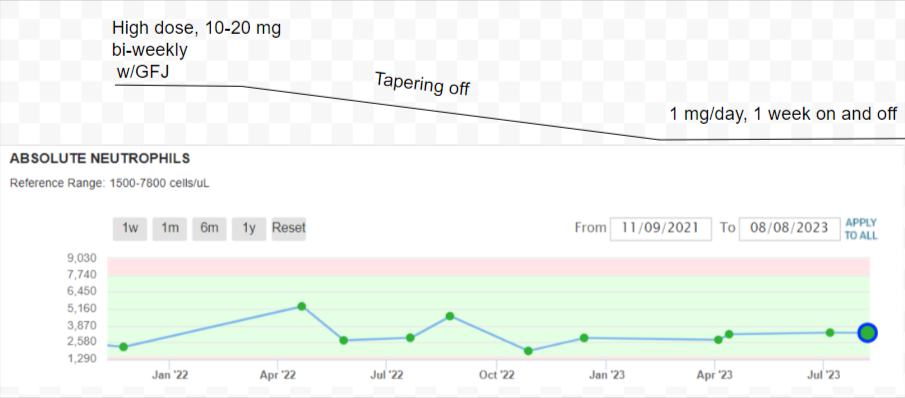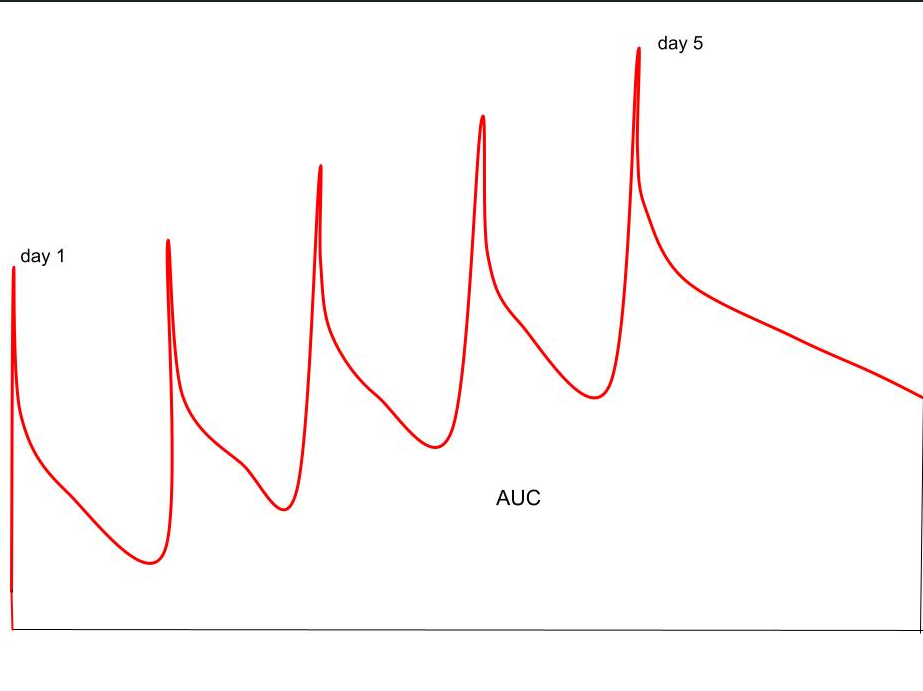@dan_hayes you are correct. Nothing wrong with your doubts. Anyone who thinks they know the correct dosing system at this point in time, is on the wrong part of the Dunning-Kruger curve.
For those of you taking a daily dose, do you have any data on impact to GI system that may be getting higher dose exposure?
how do we measure impact on the GI system? I noticed that I lost some belly fat, but no GI side effects except the product of my bowel movement is drier
I am not sure what you have in mind. Just looking at my neutrophil history, I see no obvious correlation between my rapamycin doses and neutrophile percentage. If rapamycin suppresses neutrophils, it must be for a very short time and does not show up on blood tests. There are probably too many other factors that affect neutrophils for it to be a good indicator:
“Factors that can increase neutrophil levels include Infection, Inflammation, Stress, and Vigorous exercise.”
I don’t know exactly what you are looking for, but I don’t think so.
No - there are so many.
The aging clocks that are most frequently used here are two free ones:
The Levine Phenotypic epigenetic biomarker of aging for lifespan and healthspan
Download spreadsheet for Calculation of biological age: A Friendly Biological Age Reduction Competition?
Related Paper: An epigenetic biomarker of aging for lifespan and healthspan - PMC
Background: Morgan Levine: ‘Only 10-30% of our lifespan is estimated to be due to genetics’ | Ageing | The Guardian
And Aging.AI:
Most people here use Aging.ai 3.0: http://aging.ai
Information on Aging.ai: Deep Aging Clocks: The emergence of AI-based biomarkers of aging and longevity - Neuroscience News
@desertshores what did you read, or how did you decide to go from a really high biweekly dose to a low daily dose?
Over the period of almost two years, I have tried various dosing protocols while measuring my blood work and noting the side effects they had. In a nutshell, high doses screwed up my health markers, specifically lipids and glucose. High doses with GFJ caused diarrhea and a couple of of nights of tossing and turning during my sleep.
I have done the opposite of what most people do. I have titrated down from a large dose.
Quoting from a Dr. Blagosklonny paper:
“For antiaging purposes, however, rapamycin may be used either intermittently (e.g., once a week) or at low daily doses and can be discontinued if any unpleasant effects occur.”
At a 5 to 10 mg weekly pulse dosing of rapamycin dosing with EVOO, I was still experiencing sleep disturbances on the first day even though I took the dose early in the morning.
At 1 mg daily for seven days on, and seven days off, all of my blood markers are back in the normal range, even though the half-life of rapamycin would suggest that I get a larger AUC than a weekly pulse dose of the same amount.
This chart furnished courtesy of another member of the forum, sorry, I don’t remember who, shows a predicted 5-day schedule.
Oddly, on this schedule, I feel no side effects and feel no differently on days on than days off.

@desertshores Good answer. The next question is why AUC is more important than peak rapa? What do you give up vs what do you get?
My guesses:
Give up: impact on rapa resistant tissues (brain)?
Get: longer turn down of mTOR for larger autophagy effect?
The short answer is: I don’t know. That is just a result of the dose I am taking.
Maybe it suppresses mTORC1 for a longer period of time? I am not sure whether or not 7 days on and 7 days off is ideal. If was practical for me to get my blood levels checked at the end of the 7 days off, maybe I could tell if the dose needs to be adjusted, i.e., 6 days on 8 days off for instance.
While Dr. Greene seems to be pulse dosing his patients, he has no control/comparison group taking daily dosing for a week (that I know of) and then a week off.
Thanks. I understand each of us is trying to find what works best for ourselves. It’s a bit of a “search for a black cat in a dark room.” I’m just trying to explore the variables and mechanics to understand the process better without having to try every option out on myself. We have a lot of experience in this group; if we could organize the data we would learn something useful, probably.
So, we know low dose Rapa dose not impact mtorc2, but do we have any idea IN HUMANS, what dose, or what blood level will affect mtorc1, but not mtorc2?
As a secondary question, does an increase in glucose and/or cholesterol level when taking Rapa, imply that mtorc2 is being inhibited?
I realize this has been discussed before, as it is the primary question regarding Rapa, but wondering if anyone has any new insight.
Maybe the better question is, what is the lowest dose of Rapa you can take that will inhibit mtorc1? And how will that dose impact mtorc2?
@desertshores it seems like you have a good way to determine if you’re taking too much. Do you have a way to determine if you’re taking enough?
Yeah, we will see how long I live ![]()
@KarlT This paper speaks to this question.
Targeting the biology of aging with mTOR inhibitors
https://www.nature.com/articles/s43587-023-00416-y
The key obstacle seems to be the long term sequestration of mTOR by rapa interfering with mTORC2. The answer seems to be the periodic dosing with a sufficient clearance of rapa before redosing. Perhaps the level is different for each person. The next question is is more rapa better if no side effects? Blagosklonny said yes, at one point. Is more rapa the same thing as fasting plus simultaneous rapa?
'Every study observed an extension of lifespan in one or more dosing groups"
Bottom line: Just take your rapamycin!
BTW: I visited your excellent blog site "https://www.wiseathletes.com/ ". You have had some very interesting guests.
@Joseph_Lavelle Great paper.
I’ve been reviewing older literature including some Sabatini work. Hard to find dosage data but sounds like either higher doses or long duration are going to prevent mtorc2 activity.
Sabatini:
https://www.cell.com/molecular-cell/pdf/S1097-2765(06)00218-8.pdf
Do you think then, that mtorc2 inhibition doesn’t matter? If all groups live longer, some must have some mtorc2 inhibition?
When you do your daily doses, does it impact your Hba1c, or apoB? Have you tested during your dosing days or only after?
Yes - that is the mantra I’ve read many times. Some sort of feedback mechanism between mTORC1 and mTORC2. But the exact timing and dosing levels for humans I’ve not found.

